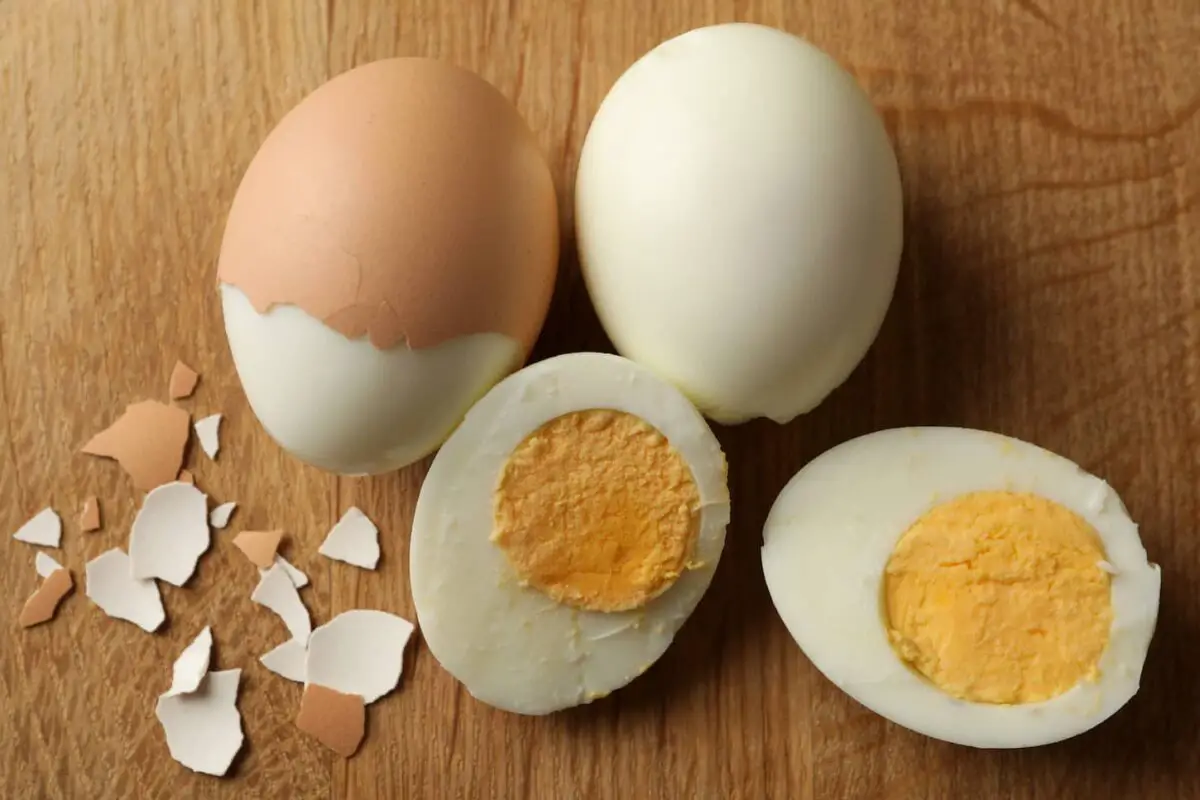If you’re looking for a way to store eggs for long-term use, dehydrating them is a great option. Dehydrated eggs can last up to a year when stored properly, and they’re perfect for camping trips, backpacking, or emergency preparedness kits. Dehydrated eggs are easy to rehydrate and use in various recipes, from scrambled eggs to baked goods.
Dehydrated eggs have the moisture removed to preserve them. No refrigeration is required, making them great for long-term storage. Dehydrated eggs are lightweight and take up less space than fresh eggs, making them ideal for backpacking, camping trips, or anywhere space and weight are at a premium.
You can use several methods to dehydrate eggs, including using a dehydrator, an oven, or even the sun. Each method has pros and cons, so choosing the one that works best for you is important. Once your eggs are dehydrated, you can store them in an airtight container in a cool, dry place. When you’re ready to use them, rehydrate them with water and use them in your favorite recipes.

Why Dehydrate Eggs?
Dehydrating eggs is a great option if you’re looking for a way to store eggs for a longer time. Dehydrated eggs have a longer shelf life than fresh eggs and can be stored for up to 10 years if done properly. Here are some benefits of dehydrating eggs:
Benefits of Dehydrating Eggs
- Easy to store: Dehydrated eggs take up less space than fresh eggs and can be stored in an airtight container or vacuum-sealed bag.
- Convenient: Dehydrated eggs are easy to rehydrate and can be used in various recipes, such as scrambled eggs, omelets, and baked goods.
- Long shelf life: Dehydrated eggs can be stored for up to 10 years (when stored properly).
- Cost-effective: Dehydrating eggs can be a cost-effective way to store eggs for long periods.
Long-Term Storage Benefits
Dehydrating eggs is a great way to ensure that you have a supply of eggs on hand, even if you don’t have access to fresh eggs. This can be particularly useful if you live in an area where eggs are not readily available or if you want to be prepared for emergencies.
In addition, dehydrated eggs can be a great option for backpacking, camping, and other outdoor activities. They are lightweight and easy to pack and can be rehydrated quickly for a nutritious meal on the go.
How to Dehydrate Eggs
We need eggs, a dehydrator, a small bowl, and a pan to dehydrate eggs. There are two methods of dehydrating eggs; dehydrating raw egg or dehydrating cooked eggs. The main difference is if they are raw or if we are cooking them first (hence the pan).
Supplies Needed
Before you start dehydrating eggs, make sure you have the following supplies:
- Eggs
- Dehydrator
- Blender or food processor
- Bowl
- Whisk or fork
- A scale
If you don’t have a dehydrator but still want to dehydrate eggs, you can make your dehydrator using our DIY steps here.
Preparation Steps
The first step to dehydrate eggs is to crack them into a bowl and whisk them together until the yolks and whites are fully combined. If you want to add any seasonings or spices, now is the time.
Use your scale to weigh the egg mixture. This will be important for getting your weight ratio later for reconstituting the eggs. Note how many eggs are in the mixture.
Next, pour the egg mixture onto the dehydrator tray. If you have a fruit-roll sheet, you can use it to ensure the egg mixture doesn’t drip through the holes on the tray. If you don’t have a fruit-roll sheet, you can use some plastic wrap (Saran wrap) as a stopgap. It works, but it does make the process take longer.
Now it’s time to start the dehydrating process.
Dehydrating Process
Set your dehydrator to 145°F (63°C) and let the eggs dehydrate for about 4 to 5 hours. The exact temperature you use will vary depending on your dehydrator and the time it takes. I’m giving you time and temperature based on my Excalibur dehydrator.
Once fully dehydrated, they will be in an egg sheet that is brittle and easily break into small pieces. You’ll want to turn the egg sheet into egg powder for easier storage.
Place the dry eggs in a blender or food processor and blend on high for best results. This will process them down into a fine powder so that they are not grainy when you reconstitute them. If you don’t have a blender, use a mortar and pestle or a seed grinder.
Weigh the powdered, dehydrated eggs. You can use this weight combined with the pre-dehydrated weight and the number of eggs to determine how much each egg weighs in its dehydrated, powdered form. Trust me, you’ll want this number written on the storage bag.
Storing Dehydrated Eggs
Store the dehydrated eggs in an airtight container in a cool, dry place. They will last several months if stored properly – or up to 5 years.
Dehydrating eggs is a great way to extend their shelf life and make them more convenient for recipes. With just a few supplies and some simple steps, you can have dehydrated eggs ready to go whenever you need them.
Storage Containers
When storing dehydrated eggs, choosing the right container is essential. You want to make sure that the container is airtight and moisture-proof. Some good options for storage containers are mason jars, vacuum-sealed bags, or Mylar bags with oxygen absorbers.
Make sure to label the container with the date of dehydration and the type of egg (raw or cooked).
Storage Conditions
The storage conditions for dehydrated eggs are also important. You should store them in a cool, dry place away from direct sunlight. Temperature fluctuations can cause condensation, which can lead to spoilage.
We’ve safely stored powdered eggs (dehydrated and freeze-dried) in plastic bags, Mylar bags, and mason jars. From my research, storing them in a can (unless it’s a #10 can and you’ve got the right kind of sealer) isn’t recommended.
Vacuum sealing the eggs will also extend the shelf-life, as will adding an oxygen absorber (whether you vacuum-seal the container or not).
It’s best to store eggs at a temperature below 70°F. If you live in a humid climate, you may want to consider storing them in the refrigerator or freezer.
Shelf Life
Dehydrated eggs have a long shelf life when stored properly. They can last up to 5 years when stored in a cool, dry place. However, it’s important to note that the shelf life can be affected by the quality of the eggs, the dehydration process, and the storage conditions.
It’s always a good idea to periodically check the eggs for any signs of spoilage, such as a rancid smell or discoloration.
In summary, when storing dehydrated eggs, it’s important to choose the right storage container, store them in the proper conditions, and periodically check for spoilage. By following these guidelines, you can ensure that your dehydrated eggs will last for years.

Using Dehydrated Eggs
If you have successfully dehydrated your eggs, you can use them in various ways. Here are some tips for rehydrating and using your dehydrated eggs.
If you didn’t weigh your pre-dehydrated eggs and egg powder (and note how many eggs went into the powder), you could use a generic 2:1 ratio of water to egg powder for rehydrating. It won’t be as good as a proper, personalized ratio, but it’s a good rule of thumb or place to start.
Rehydration Process
Before you can use your dehydrated eggs, you need to rehydrate them. Here is a simple process for rehydrating your dehydrated eggs:
- Measure the amount of dehydrated eggs you need for your recipe.
- Add an equal amount of water to the dehydrated eggs.
- Let the mixture sit for 5-10 minutes to allow the eggs to absorb the water.
- Stir the mixture until the eggs are fully rehydrated.
Recipes that Use Dehydrated Eggs
Dehydrated eggs are versatile ingredients that can be used in various recipes. Plus, they’re just delicious. Here are some recipe ideas to get you started.
| Recipe | Ingredients | Instructions |
|---|---|---|
| Scrambled Eggs | Dehydrated eggs, water, salt, pepper | Rehydrate eggs. Cook in a non-stick pan over medium heat until eggs are cooked through. |
| Baked Goods | Dehydrated eggs, flour, sugar, baking powder, salt, milk, oil | Rehydrate eggs. Mix all ingredients together. Bake according to recipe instructions. |
| Omelets | Dehydrated eggs, water, salt, pepper, cheese, vegetables, meat | Dehydrated eggs, water, salt, and pepper |
Dehydrated eggs can also be used in backpacking and camping meals. Simply rehydrate and add to soups, stews, and other dishes. Use as you would a normal scrambled egg mixture.

Frequently Asked Questions about Dehydrating Eggs
Frequently Asked Questions
We’re here to help! Check out our FAQs section below for answers to common questions. If we missed yours, let us know, and we’ll update the article. Contact us through our website, and we’ll respond directly to your question.
What’s the Optimal Temperature for Dehydrating Eggs?
The ideal temperature for egg dehydration is between 135 and 145°F. Thermal processing is the only way to ensure that someone does not contract salmonella from the eggs.
Can You Dehydrate Eggs in an Oven?
Since most ovens don’t go below 200°F, oven-drying might not be a viable or safe option for dehydrating eggs. Most ovens also have very little airflow, so dehydrators are much better for drying foods.
If there is an oven and a dehydrator – always opt for the dehydrator. If there is no dehydrator available, we can dry the eggs in the oven, but that wastes electricity, isn’t as safe, and we would be much better off with a dehydrator.
If you use the oven, watch the temperature like a hawk. Regulate the temperature immediately if it rises or drops during the dehydrating process. Eggs that are dried at a low temperature might be unsafe to eat.
How Do I Know When the Eggs Are Fully Dehydrated?
The eggs are done when they are brittle, orange, and crispy – almost resembling orange breadcrumbs.
If we take the tray from the dehydrator and start pressing the eggs with our fingers, they’ll easily break apart. We should be able to crumble the eggs into tiny crumbs with our hands (although we shouldn’t, as that will take forever and reintroduce water into the dehydrated food).
Do You Have to Cook Eggs Before Dehydrating Them?
There is no need to cook eggs before dehydrating them, but it is highly recommended to do this. The chances of contracting salmonella are much lower if the eggs are cooked before dehydration.
Can You Dehydrate Scrambled Eggs?
It is possible to dehydrate both raw and cooked scrambled eggs.
Keep the eggs on medium heat until they’re fully cooked. The only important thing to remember about scrambling eggs for dehydration is to avoid adding cheese and milk. While they would normally make scrambled eggs a finer meal, they’ll create a mess when we start dehydrating.
Can You Dehydrate Hard-Boiled Eggs?
Hard-boiling eggs before dehydrating them is just as valid as cooking scrambled eggs. The process is a bit slower, though, as we have to peel the eggs and cut them up once they are cooked.
You know what’s great about this, though? We can dehydrate the yolk and the whites separately. While this doesn’t matter to most people, if we’re only interested in dehydrating the protein-rich part of the egg, then we’ll want to separate the whites.
Once the eggs are peeled, chop them into tiny pieces and put them on the dehydrator tray.
Can You Dehydrate Eggs Sunny Side Up?
A sunny-side-up egg can be dehydrated but not recommended. Half the egg is raw, so dehydrating will be harder to get done evenly, and the white is likely to burn before the yolk is fully dehydrated. Uneven dehydration should be avoided to minimize the chances of getting salmonella.
Also, once the eggs have dehydrated, they’re all going to look the same, more or less – scrambled eggs end up looking just like hard-boiled eggs after dehydration (unless we separate the yolk from the whites).
The same rule applies to eggs sunny side up – the result is the same, only with higher chances of contracting salmonella. Therefore, scramble the eggs and stay healthy.
How Long Do Store-Bought Dehydrated Eggs Keep?
Store-bought dehydrated eggs can last up to a year, even if stored at room temperature. For comparison, home-dried eggs probably will not last more than a few weeks at room temperature, even if kept in an airtight container.
Powdered eggs, found in most stores, can last up to ten years if stored under the right conditions. Powdered eggs might be a better option than dehydrating our eggs.
First of all, they’re produced in a controlled environment. No offense to your dehydrator, but food manufacturers must adhere to strict rules enforced by the government. Their production line is undoubtedly safer and more hygienic than home production.
Secondly, they’re factory-packaged, which is far superior to home packaging. Mylar bags are great for keeping oxygen and moisture away from food but can’t be compared to factory packaging.
The only downside is they aren’t farm fresh eggs, which I think taste far superior to any commercially bought eggs.

Next Steps
Dehydrating eggs is a great way to ensure that you always have a supply of eggs on hand, even when fresh eggs may be hard to come by. Whether you’re preparing for an emergency or just looking to save money by buying eggs in bulk, dehydrating eggs can be a smart choice.
Several methods for dehydrating eggs include using a dehydrator, oven, or sun-drying. Each method has its own advantages and disadvantages, so it’s important to choose the method that works best for you.
Once you’ve dehydrated your eggs, storing them properly is important to ensure that they stay fresh and safe to eat. Vacuum-sealed bags or jars with oxygen absorbers are good options for long-term storage. It’s also important to label your eggs with the date of dehydration so that you can keep track of their freshness.
While dehydrated eggs can be a convenient and practical addition to your pantry, it’s important to remember that they do have some limitations. For example, they may not work as well in recipes that call for raw eggs, such as mayonnaise or meringue. Additionally, dehydrated eggs may not have the same taste and texture as fresh eggs, so it’s important to experiment with different recipes to find the ones that work best for you.
Overall, dehydrating eggs can be a great way to extend the shelf life of this versatile food. With a little preparation and some experimentation in the kitchen, you can enjoy the benefits of dehydrated eggs for months or even years.
Resources
Learning from your own experience is essential, but learning from others is also intelligent. These are the sources used in this article and our research to be more informed as homesteaders.
- Dried eggs. Dried Eggs – an overview | ScienceDirect Topics. (n.d.). Retrieved March 15, 2023, from https://www.sciencedirect.com/topics/agricultural-and-biological-sciences/dried-eggs.